Books by Faculty Members
2020-2021 Books
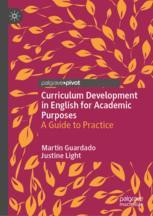 |
Curriculum development in English for academic purposes: A guide to practice Martin Guardado (Linguistics) This book introduces and explains a series of tools for curriculum renewal and revitalization in English for Academic Purposes (EAP) programs, based on the experiences of the authors in successfully implementing a new curriculum in a large EAP program in North America. The book focuses on the why and how of introducing curriculum change, while also engaging critically with the realities of day-to-day classroom practice and the important issue of teacher engagement. |
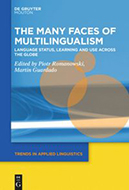 |
The Many Faces of Multilingualism Editors: Piotr Romanowski and Martin Guardado (Linguistics) Multilingualism has become an increasingly common global phenomenon especially in the last two decades. Therefore, multilingual programmes have now been regarded as a cornerstone of education systems in many countries around the world. Learning multiple languages helps us plug into a globalised world and strengthen links with a multitude of speakers from a diversified reality we live in. Thanks to the researched cases described in the chapters, further developments aimed at fostering multilingual practices in the contemporary world will be enhanced. The chapters included in the present volume, provide an overview of current theory, research and practice in the field. They deal with such prominent research topics as multilingual education, language policies, language contact, identity of multilingual speakers, to name only a few. |
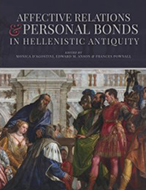 |
Affective Relations and Personal Bonds in Hellenistic Antiquity: Studies in Honor of Elizabeth D. Carney Editors: Monica D'Agostini , Edward M. Anson, and Frances Pownall (History and Classics) This volume offers a tribute to the pioneering work of Elizabeth D. Carney on the social dynamics of the Macedonian court. Moving beyond the traditional focus on the structure and functioning of monarchical institutions or on the strategic and tactical dimensions of political and military events in Ancient Macedonia, her scholarship offered the academic world a completely new perspective on the network of relationships surrounding the exercise of power at the Macedonian court. Building on the dialogue between socio-cultural and political factors developed by Elizabeth Carney, the essays in this volume, written by a team of international experts, investigate how dynastic behaviour and interpersonal relations influenced the complex history of the Hellenistic Age. |
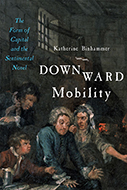 |
Downward Mobility, The Form of Capital and the Sentimental Novel Katherine Binhammer (English and Film Studies) How do the stories we tell about money shape our economies? Beginning in the late eighteenth century, as constant growth became the economic norm throughout Europe, fictional stories involving money were overwhelmingly about loss. Novel after novel tells the tale of bankruptcy and financial failure, of people losing everything and ending up in debtor's prison, of inheritances lost and daughters left orphaned and poor. In Downward Mobility, Katherine Binhammer argues that these stories of ruin are not simple tales about the losers of capitalism but narratives that help manage speculation of capital's inevitable collapse. |
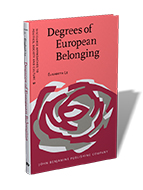 |
Degrees of European Belonging: The fuzzy areas between us and them Elizabeth Le (Modern Languages and Cultural Studies) While we tend to divide the world into Us and Them, a number of grey nuances exist beyond this white and black distinction. The purpose of this book is to address the fuzzy areas between Us and Them through the study of European belonging as it is represented in the French elite daily, Le Monde. Corpora collected from 2014 to 2017 are used for case studies in the framework of Discourse Analysis to look at the use of “Europe” in headlines, and the representation of the United Kingdom, Poland, Hungary, Romania, Ukraine, Belarus, and Turkey. The combination of these case studies allows to present a conceptual framework for the representation of Europe by Le Monde. However, beyond the study of what belonging to Europe means for Le Monde, this book is about the legitimacy of being “in-between”, i.e. belonging neither totally to Us nor to Them. |
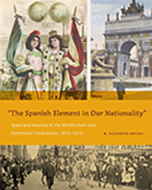 |
"The Spanish Element in Our Nationality” Spain and America at the World’s Fairs and Centennial Celebrations, 1876–1915 M. Elizabeth Boone (Art & Design) “The Spanish Element in Our Nationality” delves beneath the traditional “English-only” narrative of U.S. history, using Spain’s participation in a series of international exhibitions to illuminate more fully the close and contested relationship between these two countries. |
 |
Anaesthetics of Existence Essays on Experience at the Edge Cressida J. Heyes (Political Science) In Anaesthetics of Existence Cressida J. Heyes reconciles these two positions, drawing on examples of things that happen to us but are nonetheless excluded from experience. If for Foucault an “aesthetics of existence” was a project of making one's life a work of art, Heyes's “anaesthetics of existence” describes antiprojects that are tacitly excluded from life—but should be brought back in. Drawing on critical phenomenology, genealogy, and feminist theory, Heyes shows how and why experience has edges, and she analyzes phenomena that press against those edges. Essays on sexual violence against unconscious victims, the temporality of drug use, and childbirth as a limit-experience build a politics of experience while showcasing Heyes's much-needed new philosophical method. |
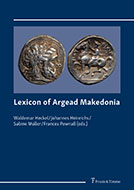 |
Lexicon of Argead Makedonia This is the first lexicon focusing exclusively on Argead Makedonia. Spanning from the mythical foundation of the realm to the death of the last Argead ruler, Alexander IV, 247 entries written by 44 international scholars provide information on central aspects of the politics, culture, society, and economy of Argead Makedonia, on the ancient evidence, and on scholarly issues. Argead Makedonia emerged in the 7th century BC. From the late 6th century to its rise to hegemony under Philip II in the 4th century BC, it formed part of Mediterranean history and crossed the paths of the Greek poleis, the Persian Empire, and neighbouring regions such as Thessaly, Illyria, and Thrace. |